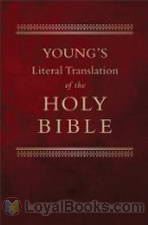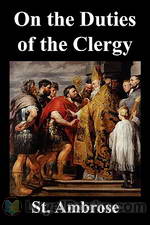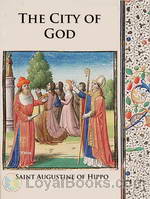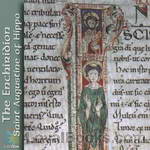|
Books Should Be Free Loyal Books Free Public Domain Audiobooks & eBook Downloads |
|
|
Books Should Be Free Loyal Books Free Public Domain Audiobooks & eBook Downloads |
|
Religion |
|---|
|
Book type:
Sort by:
View by:
|
By: Robert Hugh Benson (1871-1914) | |
|---|---|
 The Friendship of Christ
The Friendship of Christ
Robert Hugh Benson, who was educated at Eton College and Trinity College, Cambridge, was ordained an Anglican priest in 1895 by his father, the Archbishop of Canterbury. Eight years later, after weighty consideration, Robert Benson converted to Roman Catholicism. In 1904 he was ordained a Roman Catholic priest and took up residence in Cambridge, where he ministered to Roman Catholic students as their unofficial chaplain. In 1911, he was made a monsignor. Despite the brevity of his earthly life, Benson... | |
 Dawn of All
Dawn of All
In a former book, called "Lord of the World," I attempted to sketch the kind of developments a hundred years hence which, I thought, might reasonably be expected if the present lines of what is called "modern thought" were only prolonged far enough; and I was informed repeatedly that the effect of the book was exceedingly depressing and discouraging to optimistic Christians. In the present book I am attempting -- also in parable form -- not in the least to withdraw anything that I said in the former,... | |
By: Robert Michael Ballantyne (1825-1894) | |
|---|---|
 The Madman And The Pirate
The Madman And The Pirate
R. M. Ballantyne (April 24, 1825 – February 8, 1894) was a Scottish juvenile fiction writer. Born Robert Michael Ballantyne in Edinburgh, he was part of a famous family of printers and publishers. At the age of 16 he went to Canada and was six years in the service of the Hudson’s Bay Company. He returned to Scotland in 1847, and published his first book the following year, Hudson’s Bay: or, Life in the Wilds of North America. For some time he was employed by Messrs Constable, the publishers, but in 1856 he gave up business for the profession of literature, and began the series of adventure stories for the young with which his name is popularly associated. | |
 My Doggie and I
My Doggie and I
This story surrounds a child waif, a young woman, a young gentleman doctor, and an elderly lady. This tale unfolds the story of a bond that brings these unlikely friends together and merges their separate paths of life into one common path. The bond is "Dumps", or "Pompey", the "doggie". With many twists, turns, and uncertainties, the ending may surprise the reader. All's well that ends well in this doggie "tail". (Introduction by Allyson Hester) | |
 Fighting the Flames
Fighting the Flames
| |
 Twice Bought
Twice Bought
This story is set in the gold fields of Oregon, where Tom Brixton, and his best friend, Fred Westly, are digging gold to try to “make their pile”. Before leaving England, the steady and God-fearing Fred had promised Tom's mother that he would do his best to take care of his friend, but in spite of all his efforts, Tom had fallen in with bad companions and taken to gambling. He was convinced that he could make his fortune quicker by attempting to increase it at the dice or card table, and all his friend's attempts to make him see his errors were unavailing... | |
By: Robert Young (1822-1888) | |
|---|---|
 The Bible, Young's Literal Translation (YLT) - Genesis
The Bible, Young's Literal Translation (YLT) - Genesis
Young's Literal Translation is a translation of the Bible into English, published in 1862. The translation was made by Robert Young, compiler of Young's Analytical Concordance to the Bible and Concise Critical Comments on the New Testament. Young produced a "Revised Version" of the translation in 1887. After he died on October 14, 1888, the publisher in 1898 released a new Revised Edition.Young's Literal Translation in the 1898 Edition also consistently renders the Hebrew Tetragrammaton (divine name)... | |
By: Rosalind Goforth (1864-1942) | |
|---|---|
 How I Know God Answers Prayer
How I Know God Answers Prayer
This book is a testimony of how powerful prayer is, how God answers every prayer, even if it is not just how we want it answered. Rosalind Goforth was a missionary to China with her husband and children. She had many, many opportunities to prove God's faithfulness and he never failed her if she was willing to trust him and put her every problem and difficulty in his hands. Her life is a wonderful testimony of what prayer can do! | |
By: Rudolf Lothar (1865-1943) | |
|---|---|
 Golem: A legend of old Prague
Golem: A legend of old Prague
Rabbi Loeb creates a clay man to house a perfect soul that he hopes will not be blighted by human prejudices. The plan does not go as he hoped... This is one of many stories about the golem, all of which involve Rabbi Loeb , a 16th-century talmudic scholar known as The Maharal. Rodolf Lother was an Austrian writer. This story was published in the B'nai Brith journal The Menorah in 1896 and subsequently included in the author's German language book Der Golem: Phantasien und Historien . - Summary by Adrian Praetzellis | |
By: Rufus Jones (1863-1948) | |
|---|---|
 Nature and Authority of Conscience
Nature and Authority of Conscience
Rufus Matthew Jones was an American religious leader, writer, magazine editor, philosopher, and college professor. He was instrumental in the establishment of the Haverford Emergency Unit . One of the most influential Quakers of the 20th century, he was a Quaker historian and theologian as well as a philosopher. In 1917 he helped found the American Friends Service Committee. This work was delivered as a Swarthmore Lecture in August 1920 and was printed by the Swarthmore Press Ltd. | |
By: Russell Herman Conwell (1843-1925) | |
|---|---|
 Acres of Diamonds
Acres of Diamonds
Text of famous inspirational lecture and biography of Russell Conwell, a Baptist minister and Temple University Founder | |
By: Sabine Baring-Gould (1834-1924) | |
|---|---|
 Sermons to Children
Sermons to Children
Twenty-three sermons where the truth to be taught is appended to a story as a Moral. Some of these sermons reflect the doctrines of infant baptism and transubstantiation. | |
By: Saint Alphonsus Liguori (1696-1787) | |
|---|---|
 Glories of Mary
Glories of Mary
The Glories of Mary is a classic book in the field of Roman Catholic Mariology, written during the 18th century by Saint Alphonsus Liguori, a Doctor of the Church. The book was written at a time when some Jansenists (which were declared heretical by the Pope) were criticizing Marian devotions, and was written in part as a defense of Marian devotion. The book combines numerous citations in favor of devotion to the Blessed Virgin Mary from the Church Fathers and the Doctors of the Church with Saint Alphonsus' own personal views on Marian veneration and includes a number of Marian prayers and practices. | |
 Sermons for all the Sundays in the year (Sermons I - XXV)
Sermons for all the Sundays in the year (Sermons I - XXV)
This work is entitled, ABRIDGED SERMONS FOR ALL THE SUNDAYS IN THE YEAR. They are called Abridged Sermons, because, although each contains abundant matter for a sermon, the sentiments are briefly expressed—not, however, so briefly as to render the sense obscure. Hence the work may be used for spiritual lectures. Diffuseness has been purposely avoided, that the preacher may extend the subject treated in the way which may appear best to him. A preacher will scarce ever deliver, with zeal and warmth, sentiments which he has not made in some manner his own... | |
 Sermons for all the Sundays in the year (Sermons XXVI - XLIII)
Sermons for all the Sundays in the year (Sermons XXVI - XLIII)
These are the sermons of St. Alphonsus Liguori, who was an Italian Catholic bishop, and theologian. He is famous for founding the Congregation of the Most Holy Redeemer , and for his writings, which are among the most widely read in the Catholic world. His best-known works are The Glories of Mary and The Way of the Cross . He was canonized in 1839 and proclaimed a Doctor of the Church in 1871. The preface to these sermons : This work is entitled, ABRIDGED SERMONS FOR ALL THE SUNDAYS IN THE YEAR... | |
By: Saint Ambrose (337/340-397) | |
|---|---|
 On the Duties of the Clergy
On the Duties of the Clergy
Aurelius Ambrosius was a fourth century cleric who rose to become the Archbishop of Milan in 374 AD. His father was a powerful Roman general and the prefect of Gaul. His brother and sister were also consecrated as saints by the Catholic Church. As an infant, a swarm of bees settled over his face and flew away without harming the baby, but left behind a drop of honey and this was seen as a sign of his future eloquence and bees are often painted in his portraits as his symbols. Ambrosius (or Ambrose as he is referred to in English) was a highly learned man, well versed in Latin and Greek, theology and many other subjects... | |
 Concerning Virgins
Concerning Virgins
Concerning Virgins (De Virginibus) is a series of letters, compiled into three “books,” St. Ambrose wrote to his sister, Manellia, These, perhaps Ambrose’s earliest writings, were written in 377 CE. Written in a rather light-handed non-technical style they appear as ethical guides to women who are contemplating entering nunneries. More importantly, they set the tone for Ambrose’s later writing on ethics. Concerning Virgins was referred to by other patristic writers including St. Jerome, St Augustine and Cassian, and are now included in the extra-biblical cannon of the early church fathers. | |
By: Saint Augustine of Hippo (354-420) | |
|---|---|
 The City of God
The City of God
Rome having been stormed and sacked by the Goths under Alaric their king, the worshipers of false gods, or pagans, as we commonly call them, made an attempt to attribute this calamity to the Christian religion, and began to blaspheme the true God with even more than their wonted bitterness and acerbity. It was this which kindled my zeal for the house of God, and prompted me to undertake the defense of the city of God against the charges and misrepresentations of its assailants. This work was in my hands for several years, owing to the interruptions occasioned by many other affairs which had a prior claim on my attention, and which I could not defer... | |
 The Enchiridion
The Enchiridion
The Enchiridion, Manual, or Handbook of Augustine of Hippo is alternatively titled, “Faith, Hope, and Love”. The Enchiridion is a compact treatise on Christian piety, written in response to a request by an otherwise unknown person, named Laurentis, shortly after the death of Saint Jerome in 420. It is intended as a model for Christian instruction or catechesis. – As the title indicates, the work is organized according to the three graces necessary for the Christian worship of God: Faith, Hope and Love... | |
 Of Holy Virginity
Of Holy Virginity
St. Augustine wrote in his Retractions 2:23: "After I had written 'on the Good of Marriage,' it was expected that I should write on Holy Virginity; and I did not delay to do so: and that it is God's gift, and how great a gift, and with what humility to be guarded, so far as I was able I set forth in one volume. This book begins," etc. - Summary by St. Augustine | |
 On Christian Doctrine
On Christian Doctrine
De doctrina Christiana, On Christian Doctrine, is a famous treatise by Augustine of Hippo, consisting of four books that describe how to interpret and teach the Scriptures. The first three books, published in 397, set three tasks for Christian teachers and preachers: to discover the truth in the contents of the Scriptures, to teach the truth from the Scriptures, and to defend scriptural truth when it was attacked. It is believed that the last part of book three and the totality of book four were added much later, in 426. The fourth book is especially quoted for being the first treatment of the relation between Christianity and Ancient Rhetoric. Summary by Leni. | |
 Ten Homilies on the First Epistle of John
Ten Homilies on the First Epistle of John
As regards the plan of the Epistle, it has been often asserted till lately that it was supposed to be but fragmentary, a series of aphorisms. Augustine, however, without formally announcing a plan as discovered by him in the Epistle, not only frequently affirms in his exposition that charity or love is the Apostle’s main theme, but so conducts the discussion, gathering his arguments and illustrations around this central thought, as to render it evident that in his view the purpose and plan of the Apostle is to set forth love in its essence and its scope, and that he intends to make this thought dominant in every part. - Summary by Philip Schaff | |
 Expositions on the Book of Psalms Vol. 1
Expositions on the Book of Psalms Vol. 1
The Book of Psalms is commonly known as the Psalms or the Psalter, and is divided into five sections, each closing with a doxology. The title is derived from the Greek translation, ψαλμοί meaning "instrumental music" and, by extension, "the words accompanying the music". Most if not all are thought be composed by King David. The Psalms have always been an integral part of the prayers of the Christian church and especially among monks, who would generally chant all psalms in a week-long cycle... | |
 Expositions on the Book of Psalms Vol. 2 - Psalms 37-52
Expositions on the Book of Psalms Vol. 2 - Psalms 37-52
These sermons on the Psalms of the Holy Prophet and King David are as poetic as the Psalms themselves. They are well-suited for inspirational and devotional listening. - Summary by The Reader | |
 Expositions on the Book of Psalms Vol. 3 - Psalms 53-75
Expositions on the Book of Psalms Vol. 3 - Psalms 53-75
These sermons on the Psalms of the Holy Prophet and King David are as poetic as the Psalms themselves. They are well-suited for inspirational and devotional listening. - Summary by The Reader | |
 On Lying
On Lying
I have also written a Book on Lying, which though it takes some pains to understand, contains much that is useful for the exercise of the mind, and more that is profitable to morals, in inculcating the love of speaking the truth. This also I was minded to remove from my works, because it seemed to me obscure, and intricate, and altogether troublesome, for which reason I had not sent it abroad. - Summary by Augustine | |
 Expositions on the Book of Psalms (Vol. 4 - Psalms 76-101)
Expositions on the Book of Psalms (Vol. 4 - Psalms 76-101)
These sermons on the Psalms of the Holy Prophet and King David are as poetic as the Psalms themselves. They are well-suited for inspirational and devotional listening. - Summary by The Reader | |
 On Grace And Free Will
On Grace And Free Will
There are some persons who suppose that the freedom of the will is denied whenever God's grace is maintained, and who on their side defend their liberty of will so peremptorily as to deny the grace of God. This grace, as they assert, is bestowed according to our own merits. It is in consequence of their opinions that I wrote the book entitled On Grace and Free Will. This work I addressed to the monks of Adrumetum, in whose monastry first arose the controversy on that subject, and that in such a manner that some of them were obliged to consult me thereon. The work begins with these words: "With reference to those persons who so preach the liberty of the human will." | |
 On The Predestination Of The Saints
On The Predestination Of The Saints
Wherein the truth of predestination and grace is defended against the semi-Pelagians — those people to wit, who by no means withdraw altogether from the Pelagian heresy, in that they contend that the beginning of salvation and of faith is of ourselves; so that in virtue, as it were, of this precedent merit, the other good gifts of God are attained. Augustine shows that not only the increase, but the very beginning also of faith is in God's gift. On this matter he does not disavow that he once thought differently, and that in some small works, written before his episcopate, he was in error, as in that exposition, which they object to him, of propositions from the epistle to the Romans... | |
 On Adulterous Marriages
On Adulterous Marriages
One named Pollentius having written to him upon the question of separation in case of adultery, engaged him to write the books "On Adulterous Marriages". Pollentius maintained that the wife who separated from her husband, upon account of adultery on his side, might marry again; and what St. Paul says to the contrary he interpreted of her who marries again for any other reason. St. Augustine maintains that this prohibition regards her who has left her husband for the cause of adultery. Pollentius maintained also, that married persons who were believers, could not leave the unbelieving party; and St... | |
 On the Spirit and the Letter
On the Spirit and the Letter
The Tribune Marcellinus having received the books ''On the Merit of Sins," wrote to St. Augustine that he was surprised at what he had there said, that man could be without sin if he would, with the help of God: and that, nevertheless, none in this world had been, was, or would be for the time to come, so perfect. "How," said he, ''can you say that a thing is possible, of which there is no example?" To answer this question, St. Augustine wrote the book, "On the Spirit and the Letter," where he explains the passage of the Apostle, "The letter killeth, but the Spirit giveth life... | |
By: Saint Bonaventure (1221-1274) | |
|---|---|
 St. Bonaventure's Life of Our Lord and Saviour Jesus Christ
St. Bonaventure's Life of Our Lord and Saviour Jesus Christ
Seeing himself as "unequal to so great a task", St. Bonaventure nevertheless endeavored to introduce his readers to the practice of "the most beneficial of all devout exercises, and that which is most capable of leading [them] to the summit of Christian perfection": the contemplation of the life of Our Lord. By "frequent and habitual meditations on that divine subject" even "very illiterate persons" have been raised to such "familiarity, confidence, and love of him" that they have become "profoundly versed in the most sublime mysteries of God"... | |